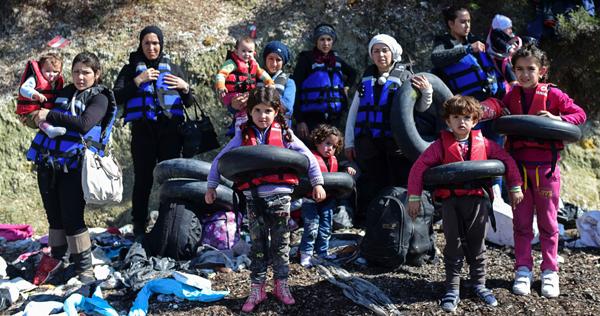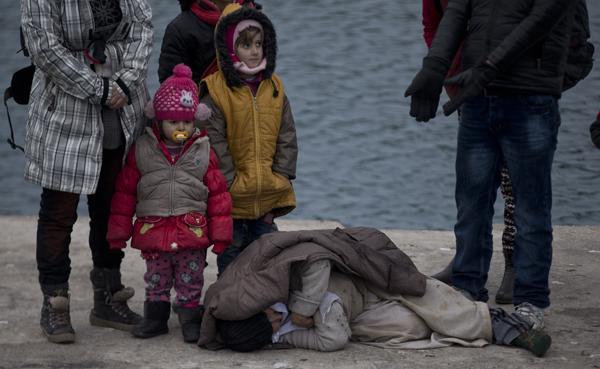You are here
Greece recalls ambassador from Austria in migrant row
By AFP - Feb 25,2016 - Last updated at Feb 25,2016

Refugees and migrants are helped by volunteers after their arrival on a dinghy from the Turkish coast to Mytilene, Lesbos, Greece, on Thursday (AP photo)
BRUSSELS — Greece recalled its ambassador from Austria on Thursday and warned it would not be treated as "Europe's Lebanon" as the migrant crisis strained relations between EU states to breaking point.
Talks between European Union (EU) interior ministers in Brussels descended into chaos due to the row over Austria's decision to call a western Balkans meeting this week without inviting Greece.
The EU's attempts to forge a unified response to the biggest migration crisis in its history are fraying as individual 28 member states increasingly take matters into their own hands to protect their borders.
The Greek foreign ministry hit out at what it called "19th-century" attitudes and said the envoy's recall was designed to "safeguard friendly relations between the states and peoples of Greece and Austria".
Athens was already seething over a series of border restrictions by Austria, Former Yugoslav Republic of Macedonia (FYRM) and Serbia along the migrant trail to northern Europe that has caused a bottleneck in Greece, the main entry point to Europe from Turkey.
Greece, still struggling with the fallout from its eurozone debt crisis last year, faces huge pressure to stop "waving through" migrants to the rest of the EU.
'Europe's Lebanon’
But Migration Minister Yannis Mouzalas accused other states of trying to make Athens take the brunt of the crisis.
"Greece will not accept becoming Europe's Lebanon, a warehouse of souls, even if this were to be done with major (EU) funding," Mouzalas told reporters in Brussels.
Lebanon hosts around a quarter of the 4 million Syrians who have fled to neighbouring countries.
In northern Greece, hundreds of migrants and refugees left an accommodation camp to walk to the distant border with FYRM, days after Skopje slashed the number of people it allows through each day.
"They are mainly youths... they do not want to wait for buses to pick them up... neither the army nor the police can stop them because there is the risk of [violence]," Thessaloniki Mayor Yiannis Boutaris said.
The crisis caused by refugees and migrants from Syria, the Middle East and Africa shows no signs of abating with 100,000 arriving in Europe so far this year on top of 1 million in 2015.
Earlier EU migration commissioner Dimitris Avramopoulos urged ministers to find a solution, warning that the crisis threatened the survival of the more than 60-year-old union.
"Lonely initiatives do not lead anywhere. Now, the unity of the union and human lives are at stake," said Avramopoulos, who is from Greece.
But Austrian Interior Minister Johanna Mikl-Leitner raised the possibility of Greece's exclusion from Europe's Schengen passport-free travel zone, which is cracking as countries reintroduce border controls.
"If it is really the case that the Greek external border cannot be protected, can it be still a Schengen external border?" she said.
German Interior Minister Thomas De Maziere warned that on Thursday's meeting was the last chance before Europe had to take more drastic steps, especially given the large numbers still coming via Greece.
"If a solution by the 7th of March is not possible, there have to be other European and coordinated measures," he said.
'Strange' Belgium
March 7 is the date of an EU-Turkey summit that will assess the progress of a 3-billion-euro ($3.2 billion) deal signed with Ankara in November to cut the flow of migrants.
A further row broke out between Paris and Brussels after Belgium decided to impose checks at its border with France to stop people coming from the "Jungle" migrant camp in Calais.
"This decision is a strange one, just as is its motivation," French Interior Minister Bernard Cazeneuve said.
Meanwhile the European Commission questioned Hungary's decision to hold a referendum on mandatory quotas for refugees, which the bloc's leaders agreed on last year to deal with the migrant crisis.
"We fail to understand how it would fit into the decision-making progress agreed to by all EU member states under the treaties," European Commission spokeswoman Natasha Bertaud told a news briefing.
In a positive development, NATO on Thursday managed to overcome sharp differences between long-time rivals Greece and Turkey to finalise an unprecedented naval mission to tackle migrant smugglers in the Aegean.
Related Articles
ATHENS — Greece warned Sunday that the number of refugees and migrants on its soil could more than triple next month, reaching as many as 70
AMSTERDAM — European Union interior ministers on Monday urged Greece to do more to control the influx of migrants, some threatening to exclu
IDOMENI, Greece — Thousands of migrants were left stranded in Greece Monday after the Former Yugoslav Republic of Macedonia abruptly c

















